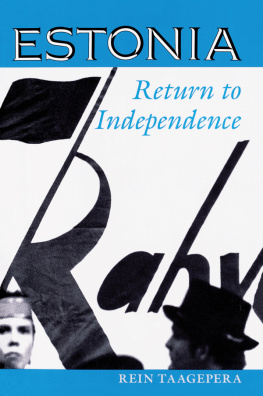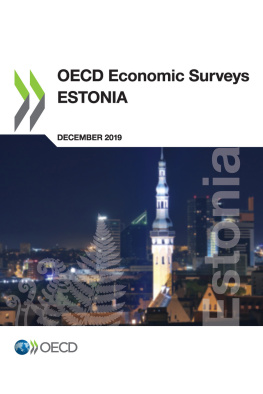AN ETHNIC PERSPECTIVE ON ECONOMIC REFORM
An Ethnic Perspective on Economic Reform
The case of Estonia
ERIK ANDR ANDERSEN
First published 1999 by Ashgate Publishing
Reissued 2018 by Routledge
2 Park Square, Milton Park, Abingdon, Oxon, OX14 4RN
711 Third Avenue, New York, NYI0017, USA
Routledge is an imprint of the Taylor & Francis Group, an in forma business
Copyright Erik Andr Andersen 1999
All rights reserved. No part of this book may be reprinted or reproduced or utilised in any form or by any electronic, mechanical, or other means, now known or hereafter invented, including photocopying and recording, or in any information storage or retrieval system, without permission in writing from the publishers.
Notice:
Product or corporate names may be trademarks or registered trademarks, and are used only for identification and explanation without intent to infringe.
Publishers Note
The publisher has gone to great lengths to ensure the quality of this reprint but points out that some imperfections in the original copies may be apparent.
Disclaimer
The publisher has made every effort to trace copyright holders and welcomes correspondence from those they have been unable to contact.
A Library of Congress record exists under LC control number: 98074641
ISBN 13: 978-1-138-60861-0 (hbk)
ISBN 13: 978-0-429-46009-8 (ebk)
This dissertation has been developed within the framework of the research project Continuity and change in Russia, Eastern Europe and the Baltic states which on the basis of a grant from the Danish Research Council for the Humanities (1993-98) was established in cooperation between the Universities in Copenhagen and Odense (Denmark) and headed by Professor Bent Jensen. Here I would like to express my gratitude for having been granted a PhD scholarship, as the establishment of an economic foundation and the consequent ability to work in peace has been the most important precondition for the creation of the dissertation. However, just as preconditions must be fulfilled in order to start the work, there may sometimes also be a need for help in finishing the work. Therefore I would also like to express my gratitude to the Copenhagen Peace Research Institute who made it possible for me to apply the finishing touches.
It would not be possible to mention by name the many people who, during the course of writing this dissertation, have contributed with critical as well as encouraging remarks, and therefore in general I will thank everybody for their contributions which in each and every case gave me inspiration to develop further reflections. However, I cannot go without mentioning two people whose contributions have been of decisive importance for the elaboration of the dissertation. These are the Head of the Institute for Theoretical Statistics at Copenhagen Business School, Hans Kurt Kvist, who despite the fact that Estonias problems have nothing in common with his ordinary work has displayed a remarkable helpfulness and has taken the time to discuss methodological problems and calculations of uncertainty, and without whose help I would hardly have been able to establish a valid basis for the methodology of names. The other person is my adviser, Associate Professor at the Institute of East European Studies at Copenhagen University, Niels Erik Rosenfeldt, who for three years has had the ungrateful task of forcing me to keep a structure on the material which otherwise threatened to spread in all directions. This robust guidance has also - I am fully prepared to admit - compelled my deep respect for what it means to make scientific research.
Likewise, during the periods of collecting sources in Estonia I have been met with great helpfulness. First and foremost I would like to thank the Economic Institute at the Estonian Academy of Sciences for making a workplace available during my long sojourns in Estonia in 1994 and 1995. The same institute has also, just like the Institute of International and Social Studies at the Estonian Academy of Sciences, been helpful in providing useful information. Likewise I am greatly indebted to the Department of Ownership Reform at the Estonian Ministry of Finance, the Estonian Privatization Agency, the Estonian Register of Enterprises, the Statistical Office of Estonia, the Municipal Register of Dwellings in Tallinn, the City Government in Tallinn, the Estonian Institute of Future Studies, the opinion and market research institute Emor, the Estonian-Russian Club of Entrepreneurs, the OSCE Mission to Estonia (offices in Tallinn, Jhvi and Narva), the Legal Information Centre on Human Rights (in Tallinn), and also the Royal Danish Embassy in Estonia - all of whom in their own manner and often at the expense of disregarding their own working tasks have found occasion to help me.
Despite all this help it is, however, the author himself who must bear the responsibility for the dissertation in its final version, and whatever mistakes there may be rest solely on the author.
In the published version of the dissertation a Postscript has been added updating developments in Estonia since 1995, mainly regarding the integration of the Russian population into Estonian society; there is also an where, on the basis of newly available information, a more accurate determination of ethnic distribution of the compensation value has been undertaken.
The book has been translated from the original Danish version into English by myself, and the laborious tasks not only of editing my horrible draft translation into readable English, but also of giving the book a more suitable structure and preparing the Index have been performed - to my complete satisfaction - by Martin Noble of Martin Noble Editorial/AESOP (All Editorial Services Online for Publishers and Writers, http://www.martinob.demon.co.uk) in Oxford, United Kingdom.
Erik Andre Andersen
Copenhagen,
June 1998
In the second half of the 1980s Estonia started the process that would lead towards full independence from the Soviet Union and the consequences of this process form the subject of my dissertation. In particular, I wish to investigate the interplay between economic reforms and ethnic divergencies in Estonia. The problem this presents is perhaps best formulated by the following question: what are the consequences of privatization for the Russian population in Estonia?
Before going into more detail I will briefly outline the background of the Estonian independence movement and the context in which it developed. Then I will examine the subject more closely and also outline those perspectives for the societal development in Estonia which have motivated my investigation. At the end of this opening chapter I will briefly outline the structure of the book.
1.1 Restoration of the Republic of Estonia
The background for the Estonian independence movement in the late 1980s was that Estonia, after having been an independent Republic in 191840, was incorporated, against its will, into the Soviet Union on 6 August 1940. From that time onwards - except for three years of German occupation during the Second World War - Estonia was under Soviet rule for half a century. In the entire period after the Second World War there was no possibility - because of Soviet repression and Western passivity motivated by










